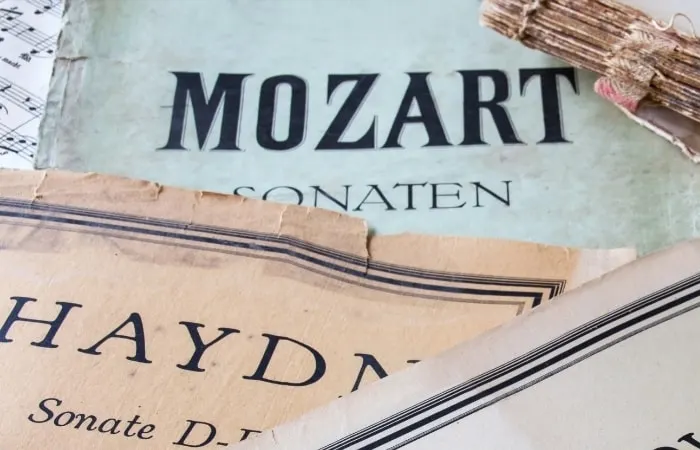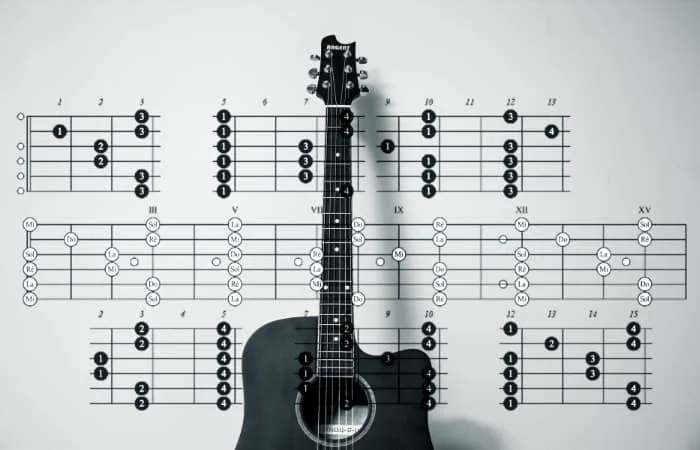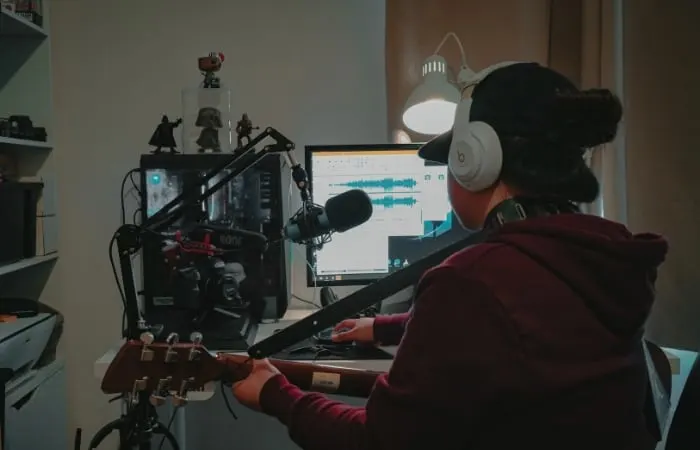The necessity of learning music theory is a hot topic among the audio community. Some people swear by it, and those who think it’s not only redundant but that it can even stifle your creativity, so who is actually right?
In this article, I’ll explore the benefits and potential drawbacks of music theory and shed some light on whether or not you need it in your producer life.
So… does music theory help with producing?
Let’s take a look!
The Short Answer
Music theory is a vast and complex subject.
Still, luckily, as a music producer, you are not required to go into extensive research and learn a whole bunch of it – basic knowledge of it will be enough to grant you loads of benefits.
Here are some of the pros of having basic music theory knowledge.
Music Theory Can Improve Your Communication And Interaction With Other Musicians
One of the great strengths of music theory is a universal and cohesive set of musical symbols that any musician in the world can easily understand. This makes for very smooth and professional communication while collaborating on a track.

With music being a collective thing, having the ability to quickly and precisely communicate your ideas with other people can be one of your greatest strengths that can potentially land you a gig that you’ve always dreamed of.
Even if you are a solo artist, chances are you’ll still ask someone to do some guest vocals or solo parts for your record.
Basic knowledge of music theory is beneficial when you’re hired to work with a band and help them get the best possible version of their initial song ideas.
Most likely, you’ll be working with the band on the fly and exchanging suggestions and ideas in the rehearsal room in the heat of the moment.

In such situations, being able to tell exactly what each member should play can enhance the flow of ideas and, in return, make for a more productive and relaxed session (I’ve been in situations where I’ve been trying to explain a 4 bar drum loop for 2 hours and trust me it’s no fun!).
Instead of humming and clapping your musical ideas, you can say: “Let’s try a triplet here at the end of the first 4 bars and see if it works”. Everyone knows what you’re talking about, and you haven’t wasted anybody’s time by singing out-of-tune melodies and pretending to be a walking metronome.
Music Theory Can Help You Write Music More Effortlessly
A lot of the time, producers struggle with not knowing how to start a song. We usually need that little spark to light up the whole creative process. However, we can’t always rely on inspiration hitting us at the right time- sometimes, we need to start working with something and hope for something good to come out eventually.
You might be approaching a deadline, and there’s no time to wait for the music to come to you.
Luckily, music theory can be that initial spark that can eventually lead you to some of the best music you’ve ever written.
Theory is really good at giving you a potent frame to work within.

Say you have to quickly come up with a relaxing synth verse- with sufficient theory knowledge, you can already know which chord pattern could potentially be the one most suited. You’ll avoid all of the trial and error searching for the right chord and quite quickly hit the jackpot.
After that, it’s just a matter of tweaking a couple of things here and there, and you’re good to go!
Music Theory Can Help You Write Better Songs
Although many people might disagree with me, I’m pretty convinced that music theory can help you write stronger and more on-point songs.
A common misconception is that music theory arose out of nowhere, and all of a sudden classical musicians were obliged to write music according to the “rules.”
The reality is quite the opposite actually- the theory was always a way to explain all of the things that have a huge emotional impact on us.

So essentially, music theory is like a centuries-old collection of the most amazing techniques that produce wonderful music.
By studying it, you can learn how certain chord progressions can emotionally affect your listeners, and in return, you can create more soulful songs that deeply resonate with your audience.
You can pick a theme or just an emotion and build your song around that idea quite effectively and effortlessly. After a while, you’ll begin to associate different chord combinations with a particular “feel.”

For example, playing a natural minor dominant after the minor tonic always gives me those “ethereal” vibes, or playing a major tonic after an IV major chord makes you feel warm and fuzzy inside.
Exploring those musical relations can really step up your songwriting game and help you create highly emotional and engaging songs.
Music Theory Can Help You Fix The Issues In Your Songs
Often we have a pretty solid song, but some things just don’t sound right, and we can’t really tell what’s the problem.
In such cases, solid music theory knowledge can really come in handy.
You can analyze your chord progression or melody structure and see exactly what causes the problem. You might have played a 4th in a major chord (that can eventually sound OK if you know what you’re doing, but most of the time, it just sounds weird), or your melody might feel a bit vague because you haven’t included any thirds in it.

Some situations are not as clear-cut as playing a wrong note- there’s just something about it that sounds kind of wrong, and it’s hard to put your finger on why.
In these situations, learning theory can quickly expose problem areas and let you fix them without discarding the whole idea altogether.
Furthermore, having strong and logical chord structures will not only make the song itself better an help you with the mixing process.
Weird chord structures (missing key intervals and bad voice leading) can dramatically influence the stability of a mix.

For example, omitting certain intervals can lead to chords sounding thin. You might be thinking that the problem lies in the instrument not being good enough when the actual problem is in the chords not being properly built.
Music Theory Can Make Your Music Sound Fresh and Novel
Although you might think that theory is there only to enhance what is already proven to work, there is a bit more to it actually.
True innovation can only occur once you know what has already been done before.

By familiarizing yourself with what has been used in the past, you can venture into some less explored territories and hopefully become inspired to incorporate some of that newfound knowledge in your own songs.
That is a great way to stand out among the many competing producers and create a unique style for which you’ll be sought after and recognized.
Why Do Some People Have A Problem With Music Theory?
Since I’ve been on both ends of the spectrum regarding the usefulness of music theory, I believe I can add some constructive arguments to the discussion.

Most opponents argue that music theory limits your creativity and takes the purity away from making music by ear, but is that actually true?
I believe that the main problem lies in our attitude towards music theory rather than the theory itself.
I can definitely relate to the counter-argument.
I remember missing that innocent approach to making music where I was just playing random notes on my instrument until I would come up with something that sounded amazing to me. I was definitely trying to “play by the rules,” so to speak, and considered such attempts as a thing of the past once I’ve gained substantial knowledge of music theory.

But that is precisely where the problem lies- in our view of music theory being the “right way of doing things” when in reality it is just one of the ways of looking at music and most definitely not the only one.
I like to look at it as a source of inspiration rather than a limitation.
There are so many cool concepts that you can study and make great music with, but also, it’s important to acknowledge you are absolutely free to disregard all of that and create whatever feels right to you.
Once you shift the perspective from looking at it as a set of rules regarding it as a set of tools, some amazing things can happen without sacrificing your creative potential in any way.
Does Music Theory Help With Producing? – FAQ
Do you need to know music theory to produce electronic music?
You can absolutely do it without ever knowing the name of any note, but there are plenty of benefits, even for an electronic music producer. After all, the general principles are still the same regardless of the genre.
What music theory knowledge would be most useful for me for music production?
I’d say that focusing on chord structure and some basic rhythmic vocabulary is a great way to start. With it, you can communicate most of your ideas to other people.
Does someone need to know music theory to make beats?
It’s definitely not essential; however, you can definitely benefit from learning about the time signature and all the rhythmic values there are.
What are the basics of music theory?
First of all, get familiar with the basic terminology, such as which notes and time signatures there are. After that, it’s useful to learn about intervals and then proceed to learn about scales and chords. You do not have to learn all of the scales and chords. Start by getting familiar with the major scale and minor scale and gradually learning how chords are built. Also, learning about instrument ranges and their standard tunings can really help when it gets to tracking and mixing the song.
How long does it take to learn basic music theory?
The fundamental stuff can be learned in a couple of days, while the slightly advanced concepts will probably take weeks before you fully master them.
Do famous producers know music theory?
Some of my favorite producers do not know a single thing they’re playing but still create amazing music. Having said that, I’d say that most of the producers have at least some basic knowledge about music theory.
How difficult is music theory?
Contrary to what many people think, music theory isn’t all that difficult to understand. It might be a bit confusing initially, but eventually, you realize that everything is tightly connected. For example, scales and chords are essentially the same things played differently.
Do you need a piano to learn music theory?
Some instruments, such as the piano, are great at helping you understand some musical concepts, but it is not necessary to play the piano. Any other instrument such as the guitar is just as good, or even not having an instrument at all.
What is the best way of learning music theory on your own?
There are plenty of sources online where you can get all the information you need. Look for someone who plays an instrument you’re familiar with so that it’s easier for you to follow along. Alternatively, you can buy a music theory book.
Should music producers know how to play an instrument?
I’d say that playing an instrument can really deepen your understanding of music and, in turn, make you a better producer. If you are not familiar with any instrument, I’d strongly suggest learning some basic piano techniques as you’ll probably control all of your VST’s through a midi keyboard.
Final Words
In the end, it’s up to you. If music theory is something that interests you and will help develop your skills as a producer, by all means, give it a go and learn it.
But if not, and you’ve been producing music without any knowledge of music theory, then that’s also cool.
If you are still on the fence and want to learn some basics, check out our guide to playing any song with just 4 chords HERE.

 Want to connect with other music producers for help and guidance?
Want to connect with other music producers for help and guidance?